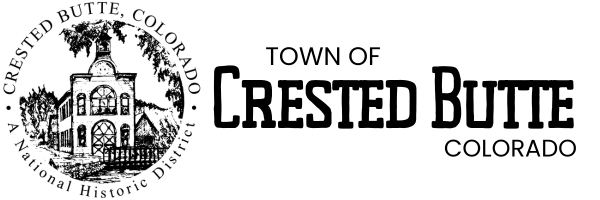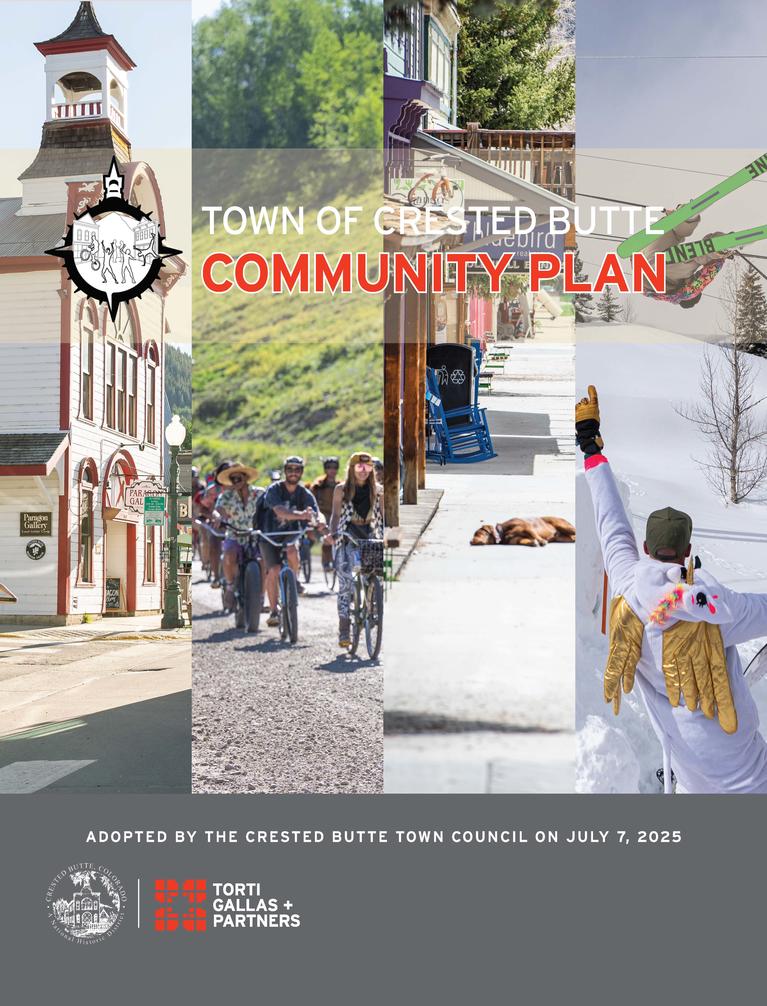Community Plan
Supporting our core community values.
Adopted July 2025, the CP provides a roadmap to maintain, grow, and support Crested Butte's full-time community while preserving its character. It identifies zoning tools and incentives so the free market can play a larger role in producing housing and commercial spaces that serve the community. Key priorities include supporting diverse, community-serving housing and encouraging community-serving commercial spaces like local businesses, nonprofits, eateries, and gathering places.
Here's What' Happening Next:
Zoning Code Update and 5-Year Complimentary Strategies
Zoning Code Update: Launching this fall to clarify rules, reduce inconsistencies, apply the CP identified incentives, and guide development toward community-serving housing and commercial spaces.
How can I participate and what does this mean for my zone?
We invite you to join an introductory webinar for your zone. An Informational Fact Sheet for each zone is linked below:
Oct 29 at 4 pm: Mobile Home Districts (M)
Mobile Home Districts (M) Zone Webinar Recording
Oct 30 at 12pm: Higher Density Residential Districts (R4 and T)
Information Sheet for R4 and T Zones
Higher Density Residential Districts (R4 and T) Zone Webinar Recording
Nov 6 at 12pm: Mixed use districts (B3, B4, R3C)
Information Sheet for B3, B4 and R3C Zones
Nov 7 at 10am: Business 1 District (B1-Elk Avenue)
Business 1 District (B1-ELk Avenue) Zone Webinar Recording
Nov 11 at 4pm: Business 2 District (B2-Sixth Street)
Business 2 District (B2-Sixth Street) Zone Webinar Recording
Nov 12 at 4pm: Commercial District (C-Belleview)
Nov 20 at 12pm: Residential Districts (R1s and R2s)
Town of Crested Butte Zoning Code Update Survey
During each session, you will have the opportunity to learn about why the code is being updated, what is being considered, and how it could impact your property.
Each webinar will discuss initial considerations, and your voice is critical to making sure the code reflects the values and needs of our community. Think of the webinar as an opportunity to learn about the background, process, and potential changes. You can then take your time to share feedback via the survey, along with a recording of the session.
Thank you for helping guide Crested Butte’s future while protecting what makes it special. If you have questions in the meantime, please reach out to our Community Development Team at planning@Crestedbutte-co.gov.
FAQs:
Why is the code being updated and what’s guiding it?
The Community Plan sets a long-term vision to keep Crested Butte, Crested Butte, preserving the people, places, and values that define the community while addressing pressing challenges. Crested Butte faces an escalating affordability crisis, a concentrated and vulnerable economy, and a decline in its percentage of full-time residency. Current zoning regulations have not produced enough of the housing, services, and infrastructure residents need, with new development producing amenities catering to tourism and part-time residents outpacing these needs. At the same time, community members have expressed strong concern about losing access to locally rooted businesses, nonprofits, and affordable gathering places that make daily life possible and strengthen the connections that contribute to Crested Butte’s sense of community.
To respond, the Community Plan established a vision and guiding principles for updating the zoning code:
1. Simplify the Code: Make the zoning code and development review process easier to understand and navigate.
Success could look like: A clearer, more user-friendly code for property owners, developers, staff, and decision-makers.
2. Retain Small-Town Feel: Celebrate the character of Crested Butte from the look and feel of our buildings to the people and moments that make this place feel like home. Keep zoning tools like Floor Area Ratio (FAR) limit that help neighborhoods stay authentic and approachable while allowing flexibility that supports connected, neighborly lifestyle.
Success could look like: New buildings and updates feel like they belong and reinforce the small-town character that defines Crested Butte.
3. Strengthen Historic Preservation: Implement the Historic Preservation Plan recommendations to create a new Early Recreation Era period of significance, and continue to maintain historic preservation for the historic core/Mining Era period of significance.
Success could look like: Strong, enforceable protections for both the established historic core and a new overlay for Early Recreation Era properties currently being surveyed.
4. Integrate Land Use with Transportation and Climate Action: Update land use regulations to support community-serving housing and commercial spaces, and climate and mobility goals, to provide more opportunities for people to live closer to where they work.
Success could look like: Allowing ADUs and multi-family homes as permitted uses instead of conditional uses, which would reduce process barriers but maintain design standards.
5. Link Zoning to Community Benefits: Implement the zoning incentives identified in the Community Plan in exchange for public benefits like community-serving housing and spaces, and improved mobility. Recommendations from the Community Plan include:
Residential Zones: Revamp incentives for ADUs, enable micro-lot subdivisions, and modernize the home occupation definition.
R4 Zone: Preserve and support compatible multi-family housing
Commercial Zone (Belleview): Provide flexibility on height and setbacks in exchange for a higher requirement of deed restricted commercial space and/or housing. Set the corridor up for improved pedestrian connectivity.
Business 2 Zone (Sixth Street): Improve the PUD process with clearer expectations and community benefits. Instead of incentivizing underground parking, tie incentives to community-serving housing and spaces instead.
Mobile Home Zone: Allow modular or stick-built units in exchange for permanent deed restrictions.
Town-Wide: Expand trails and sidewalk connections identified in the Transportation Mobility Plan, reduce parking requirements where appropriate, and maintain space for the realities of snow storage.
Success could look like: Zoning incentives that reflects the character of each area while providing clear community benefits.
What will this process look like?
This is just the beginning.
- Over the summer, Town Staff, its attorney, BOZAR, and the Town Council conducted an initial review to refine guiding strategies, assess the current code, and draft an updated framework.
- Now, we want to hear from you. The next phase through this fall and early winter includes introductory webinars for each zone district, followed by a survey open through the end of the year to share your feedback.
- Starting in the new year through the winter and spring, we will take your input to refine a draft and return for additional outreach and engagement.
Coming up...5-Year Complimentary Strategies
Community Housing Strategy: A tactical plan to advance housing goals by assessing our current portfolio and programs, identifying gaps and needs, and prioritizing projects, programs, and funding that align with the updated zoning code.
Community Spaces Strategy: A strategic framework to support community-serving businesses and organizations, evaluate current gaps and challenges, and set metrics for ongoing success.
Resource Library
- Community Plan Process
Plan development will follow the Community Compass decision-making framework to establish a goal, define success measures, develop alternatives, and make decisions using informed consent. The general timeline for the plan includes:
Phase 1 – Discovery (March– May 2024)
The first phase is focused on data collection and analysis, including a policy review, economic market study, and review of the housing needs assessment, which will culminate in better understanding the challenge and defining the goal.
Phase 2 – Desire and Continued Discovery (June– August 2024)
Phase two continues data analysis and adds Community Outreach through summer Compass Navigation events, surveys and block parties. Targeted stakeholder and focus group interviews will take place during this period as well. Draft success measures will then be crafted by synthesizing community feedback.
Phase 3 - Design (September– January 2025)
In this phase, community outreach continues, culminating in a design charrette. The charrette will interactively sketch alternative future build-out scenarios for the Town, which will be guided by and filtered through the success measures. After the charrette, the Community Plan advisory committee will work through refining alternatives, which will culminate in a draft plan.
Phase 4 - Discussion (February - June 2025)
In the final phase, community outreach continues to refine the alternatives and draft plan, which will culminate in recommendations to inform an update to the Town’s Zoning Code and Design Guidelines and Standards in 2025.
- Advisory Committee Information
Advisory Committee: The Community Plan advisory committee is comprised of one Council member, one BOZAR member, and residents, local business owners, and community members. Advisory committee meetings are open to the public, but public comment may not be taken. Please email planning@crestedbutte-co.gov with any feedback or questions on the CP.
Past Meeting Materials:
- Committee Meeting #1: March 22, 2024 - Agenda/Packet
- Committee Meeting #2: May 31, 2024 - Agenda/Packet
- Committee Meeting #3: August 23, 2024 - Agenda/Packet
- Committee Meeting #4 (Design Charrette Check In): September, 12, 2024
- Committee Meeting #5: November 22, 2024 - Agenda/Packet
- Committee Meeting #6: December 5, 2024 - Agenda/Packet
- Committee Meeting #7: December 20, 2024 - Agenda/Packet
- Committee Meeting #8: January 31, 2025 - Agenda/Packet
- Committee Meeting #9:April 10, 2025, 9-11 am - Agenda/Packet
- Outreach Materials and Resources
- Meeting Recording: Design/Build Focus Group on Draft Plan
- Community Plan Charrette Report
- Community Design Charrette Friday Presentation Recording
- Policy Review Summary
- Economic Market Report
- Gunnison Valley Housing Needs Assessment (2024)
- Public Policy Forum: Justin Farrell in conversation with Neal Payton, "Resort Economics: How can mountain towns and their communities thrive into the future?" Moderated by Jason Blevins of the Colorado Sun. Listen to the recording.


